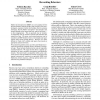Free Online Productivity Tools
i2Speak
i2Symbol
i2OCR
iTex2Img
iWeb2Print
iWeb2Shot
i2Type
iPdf2Split
iPdf2Merge
i2Bopomofo
i2Arabic
i2Style
i2Image
i2PDF
iLatex2Rtf
Sci2ools
138
click to vote
AAAI
1996
1996
Rewarding Behaviors
Markov decision processes (MDPs) are a very popular tool for decision theoretic planning (DTP), partly because of the welldeveloped, expressive theory that includes effective solution techniques. But the Markov assumption--that dynamics and rewards depend on the current state only, and not on history-is often inappropriate. This is especially true of rewards: we frequently wish to associate rewards with behaviors that extend over time. Of course, such reward processes can be encoded in an MDP should we have a rich enough state space (where states encode enough history). However it is often difficult to "hand craft" suitable state spaces that encode an appropriate amount of history. We consider this problem in the case where non-Markovian rewards are encoded by assigning values to formulas of a temporal logic. These formulas characterize the value of temporally extended behaviors. We argue that this allows a natural representation of many commonly encountered non-Markovian re...
AAAI 1996 | Decision Theoretic Planning | Intelligent Agents | Non-Markovian Rewards | State Spaces |
Related Content
| Added | 02 Nov 2010 |
| Updated | 02 Nov 2010 |
| Type | Conference |
| Year | 1996 |
| Where | AAAI |
| Authors | Fahiem Bacchus, Craig Boutilier, Adam J. Grove |
Comments (0)

